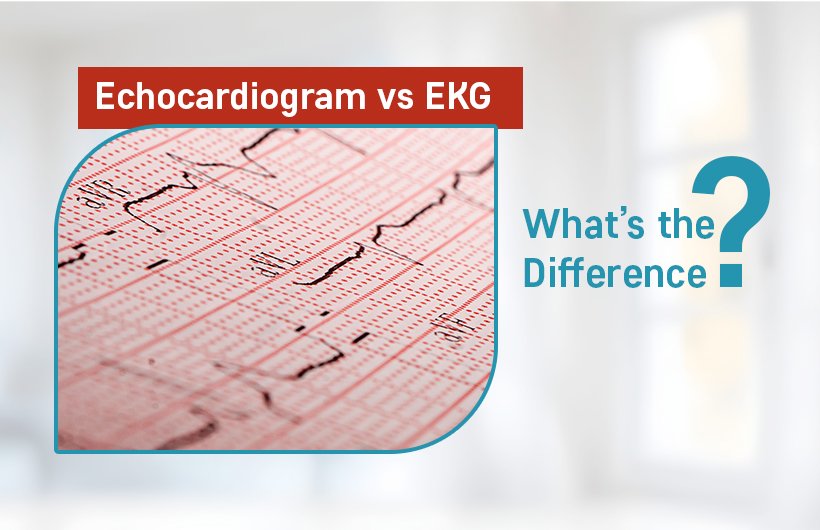Both echocardiograms and EKGs are common diagnostic tools used to evaluate heart health, but they’re not the same. In this blog, we compare echocardiogram vs EKG, outlining their key differences, when each is used, and what to expect during each procedure. Whether you’re experiencing symptoms or undergoing routine screening, knowing the right test for your condition can lead to faster and more accurate diagnosis. If you’re consulting a heart doctor in Ahmedabad or exploring options for a cardiologist package in Ahmedabad, understanding these tests is essential.
Echocardiogram vs EKG: A Quick Overview
When it comes to heart diagnostics, people often get confused between these two important tests. Although they may be prescribed together, the difference between an EKG and an echocardiogram lies in their function, technology, and the information they provide.
Here’s a simple echocardiogram vs EKG comparison:
| Feature | Echocardiogram | EKG (Electrocardiogram) |
| What It Does | Uses ultrasound to create images of the heart | Measures the electrical activity of the heart |
| Technology Used | High-frequency sound waves | Electrodes and monitors |
| Purpose | Examines heart structure and blood flow | Detects irregular heart rhythms and damage |
| Duration | 20–45 minutes | 5–10 minutes |
| Invasiveness | Non-invasive | Non-invasive |
| Common Uses | Valve issues, chamber enlargement, heart failure | Arrhythmias, heart attacks, palpitations |
| Other Names | Echo | EKG / ECG |
In short, EKG vs echo is not a matter of which test is better, but which one suits the specific condition you’re being evaluated for.
What Is an Echocardiogram?
An echocardiogram is a non-invasive imaging procedure that uses high-frequency sound waves to produce detailed images of the heart’s structure and function. It provides valuable insight into the pumping strength of the heart, the condition of its valves, and the motion of the heart walls.
Key Features of an Echocardiogram:
- Conducted using a handheld transducer placed on the chest
- Often combined with Doppler imaging to assess blood flow
- Can be done at rest or under stress (stress echocardiogram)
Common Reasons for an Echocardiogram:
- Detecting heart valve diseases such as stenosis or regurgitation
- Diagnosing cardiomyopathies or heart enlargement
- Monitoring congenital heart defects
- Evaluating damage after a heart attack
If your physician suggests this test during a cardiologist package in Ahmedabad, it’s likely to assess the physical structure and functionality of your heart.
What Is an EKG (Electrocardiogram)?
An EKG, also known as an ECG, is a fast and simple test used to detect the heart’s electrical signals. Sticky electrodes are placed on your chest, arms, and legs to track the electrical impulses that make the heart beat.
Key Features of an EKG:
- Typically takes 5–10 minutes
- No pain or discomfort involved
- Results are available immediately
What Does an EKG Detect?
- Irregular heart rhythms (arrhythmias)
- Heart attacks (past or ongoing)
- Heart blockages or electrolyte imbalances
- Damage to the heart muscle
Doctors use this test frequently during emergencies or as part of routine screenings, especially for patients experiencing symptoms like chest pain or palpitations. If you’re visiting a cardiologist near you, an EKG might be the first step in your diagnosis.
When Is an Echocardiogram Recommended?
An echocardiogram is recommended when your doctor needs detailed insight into your heart’s function and structure. It is not just a reactive test—it’s also preventive.
Common Scenarios:
- You have symptoms such as shortness of breath, fatigue, or swelling in the legs
- A murmur is heard during a physical exam
- You’ve had a heart attack, and the doctor wants to assess heart function
- Monitoring existing conditions like congestive heart failure or atrial fibrillation
In Ahmedabad, a reputable heart doctor will include echocardiography in comprehensive cardiac evaluations, especially if you’re experiencing unexplained symptoms or have a history of heart disease.
When Do You Need an EKG?
An EKG is often the go-to test for rapid detection of heart rhythm and rate problems. It’s especially useful for acute symptoms and can also be used regularly in patients with chronic heart conditions.
Situations Where EKG Is Used:
- Unexplained chest pain or pressure
- Palpitations or fluttering sensations
- Feeling dizzy or lightheaded
- Screening before surgery or for high-risk patients
Real-Life Example:
Imagine a patient visiting a heart doctor in Ahmedabad with chest discomfort. An EKG is conducted immediately to rule out arrhythmia or a recent heart attack. If abnormalities are found, the patient may be referred for an echocardiogram for further imaging.
Understanding EKG vs echo in clinical scenarios highlights how both are essential but serve different purposes.
Do You Need Both? Understanding Combined Use
Yes, and quite frequently. A cardiologist near you may recommend both tests for a comprehensive heart assessment. These tests complement each other beautifully:
- EKG gives a snapshot of the heart’s electrical health
- An echocardiogram provides a live video of its physical function
Together, they allow cardiologists to detect and confirm various heart problems—from arrhythmias to structural defects—ensuring no stone is left unturned. If you’re looking at a cardiologist package in Ahmedabad, both of these tests are often included to ensure thorough evaluation and peace of mind.
Conclusion: Choose the Right Test with Expert Guidance
The difference between an EKG and an echocardiogram is clear: one examines your heart’s rhythm, and the other examines its structure. Both are non-invasive, quick, and critical in modern cardiac care.
If you’re unsure which test you need—or suspect you may need both—consult a specialist like Dr. Jignesh Patel, a trusted and experienced heart doctor in Ahmedabad. Known for his precise diagnostic skills and patient-first approach, Dr. Patel offers comprehensive heart care, including both EKG and echocardiogram, as part of affordable cardio packages in Ahmedabad.
Take charge of your heart health today by booking a consultation with Dr. Jignesh Patel, a leading cardiologist near you.






